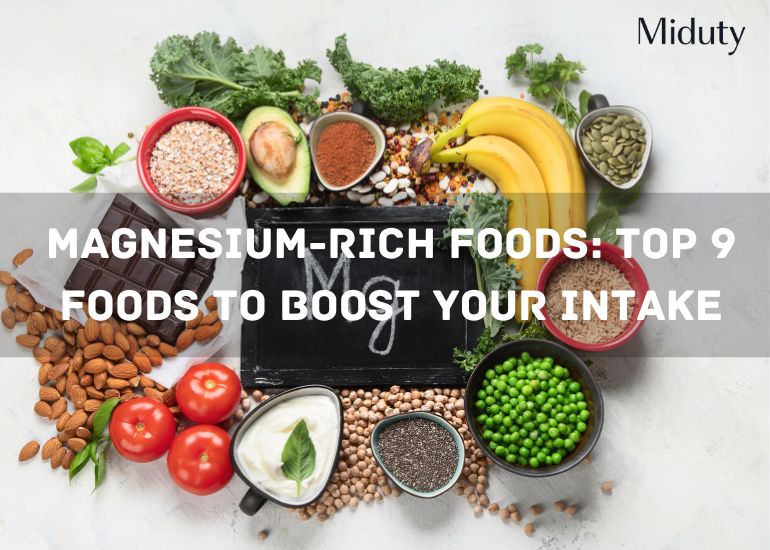
Magnesium-Rich Foods: Top 9 Foods to Boost Your Intake
Introduction | Health Benefits of Magnesium | Symptoms of Magnesium Deficiency | Top 9 Magnesium-rich Foods | Tips on Magnesium Intake | Best Magnesium Supplement? | Conclusion | FAQs | References
Key Takeaways
1) Magnesium's Vital Role: Magnesium supports over 300 body functions, aiding muscle and nerve health, energy production, heart health, mental well-being, and bone strength, yet it's often neglected in our diets.
2) Deficiency Symptoms: Signs of low magnesium include muscle cramps, fatigue, appetite loss, and mood issues like anxiety, with severe deficiency potentially leading to osteoporosis.
3) Top Magnesium-Rich Foods: Foods like leafy greens, nuts, seeds, legumes, dark chocolate, and fatty fish are excellent sources of magnesium, offering an easy way to increase daily intake.
4) Tips to Boost Intake: A diverse diet, mindful cooking methods, and, if needed, supplements can help you maintain adequate magnesium levels and avoid deficiency.
5) Choosing Supplements: For those needing extra support, magnesium bisglycinate is gentle on the stomach and offers effective absorption, making it a preferred supplement choice.

We often reach for a multivitamin to fill nutritional gaps, but how often do we consider the powerhouse mineral magnesium? Many people remain unaware of magnesium deficiency, even when experiencing its symptoms. This is because the signs can be subtle or easily mistaken for other health issues. Fatigue, muscle cramps, headaches, and irritability are common symptoms, but they are often attributed to stress or general tiredness.
As a result, we don't realize that these could be linked to low magnesium levels. Without proper knowledge or testing, magnesium deficiency can go unnoticed, leading to ongoing discomfort and health challenges that could be improved with better magnesium intake.
Magnesium plays a crucial role in over 300 body functions, from energy production to muscle relaxation, yet it's often overlooked.
If you're feeling drained, tense, or having trouble sleeping, a magnesium boost might be just what you need.
Dive in as we explore the top 9 magnesium-rich foods to help you easily increase your intake and feel your best!
This blog will explore the importance of magnesium, the consequences of deficiency, and a detailed look at ten magnesium-rich foods that can easily be incorporated into your diet.
What are the Health Benefits of Magnesium?
|
Benefits |
Description |
|
Muscle and Nerve Function |
Magnesium supports nerve transmission by helping in the release of neurotransmitters, which communicate signals between the brain and muscles. This mineral also helps prevent muscle cramps and spasms, making it essential for overall muscle health and effective nerve function. [1] |
|
Relieves Constipation & Acid Reflux |
Magnesium can be highly effective in relieving constipation due to its natural laxative properties. It attracts water into the intestines, softening stool and promoting smoother bowel movements. This gentle mechanism aids in regularity and helps prevent the discomfort associated with constipation. Additionally, magnesium can help manage acid reflux by relaxing the muscles at the end of the food pipe and neutralizing stomach acid, which reduces heartburn and the upward movement of acid into the esophagus. [6] |
|
Bone Health |
Approximately 60% of magnesium in the body is stored in bones. Magnesium is vital for bone health as it contributes to the structural development of bones and plays a key role in calcium metabolism. It helps regulate calcium levels in the body, ensuring that calcium is properly absorbed and utilized in the bones. [2] |
|
Heart Health |
Magnesium is essential for heart health as it helps regulate blood pressure, maintain a steady heartbeat, and support overall cardiovascular function. It plays a critical role in the relaxation of blood vessels, which promotes healthy blood flow and reduces the risk of hypertension. [3] |
|
Mental Well-Being |
Magnesium is a true powerhouse for your well-being, acting as a natural stress buster and energy booster! This essential mineral helps regulate mood, improve sleep quality, and combat fatigue, making it your go-to ally for a balanced life. [4] |
|
Energy Production |
Magnesium is your body's secret weapon for energy production, fueling the powerhouse of your cells—ATP (adenosine triphosphate). This mighty mineral plays a crucial role in converting the food you eat into energy, ensuring that you have the stamina to tackle your day. [5] |
|
Electrolyte Balance |
Magnesium plays a crucial role in maintaining electrolyte balance by helping regulate levels of other essential minerals like sodium, potassium, and calcium in the body. This balance is vital for proper muscle function, nerve signaling, and fluid regulation. Magnesium acts as a cofactor in the active transport of electrolytes across cell membranes, which ensures that cells are adequately hydrated and function efficiently. [7] |
|
Enhanced Athletic Performace |
Magnesium enhances athletic performance by supporting energy production, muscle function, and oxygen delivery to muscles. It is involved in the production of ATP, the primary energy molecule, which helps sustain endurance and reduce fatigue during physical activity. Magnesium also prevents muscle cramps and spasms by aiding in muscle relaxation and contraction. Additionally, it helps manage lactic acid buildup, which can delay the onset of muscle soreness and promote faster recovery after intense exercise. [8] |
What are the Symptoms of Magnesium Deficiency?
A magnesium deficiency can manifest in several ways, including:
- Constipation
- Acid Reflux
- High Blood Pressure
- Muscle cramps or spasms
- Fatigue or weakness
- Nausea and vomiting
- Loss of appetite
- Mental disorders such as anxiety or depression
- Osteoporosis in severe cases
- Mental Fog
What are the Top 9 Magnesium-rich Foods?
Now that we understand the importance of magnesium, let's explore ten foods that can help you meet your daily requirements.
|
Food |
Description |
Leafy Greens |
Leafy greens are among the richest sources of magnesium. A cup of cooked spinach provides about 157 mg of magnesium. They can be easily added to salads, smoothies, or sautéed as a side dish. Examples include Spinach, Swiss chard, Kale, Spinach, and more. |
Nuts |
Nuts are an excellent source of magnesium, a vital mineral that supports numerous bodily functions, including muscle and nerve function, bone health, and energy production. Varieties like almonds, cashews, and walnuts are particularly rich in magnesium, which helps regulate blood sugar levels, reduce muscle cramps, and improve sleep quality. |
Legumes |
Legumes such as black beans, chickpeas, and lentils are excellent sources of magnesium, fiber, and protein. One cup of cooked black beans offers approximately 120 mg of magnesium. They can be used in soups, stews, or as a base for salads. |
Dark Chocolate |
Dark chocolate (70% cocoa or higher dark chocolate) is not only a delicious treat but also an impressive source of magnesium, especially when it contains 70% cocoa or higher. One ounce of dark chocolate provides around 64 mg of magnesium, along with antioxidants and a boost of iron. Enjoy it on its own, add it to oatmeal, or mix it into a trail mix for a satisfying and nutrient-dense snack. |
Avocado |
Avocado is not just a trendy fruit; it's also a great source of magnesium. One medium avocado contains about 58 mg of magnesium. Use it in salads, spreads, or smoothies for a creamy texture and nutrient boost. |
Fish |
Fatty fish such as Mackerel, Salmon are not only rich in omega-3 fatty acids but also provide a good amount of magnesium. A 3-ounce serving of mackerel contains approximately 82 mg of magnesium. Incorporating fish into your diet can support heart health while boosting magnesium levels. |
Bananas |
Bananas are often praised for their potassium content, but they also provide magnesium. A medium banana contains about 32 mg of magnesium. They make for a quick and easy snack, and you can add them to smoothies or oatmeal for extra flavor and nutrition. |
Seeds |
Seeds, such as pumpkin, sunflower, and chia seeds, are packed with magnesium, which plays a crucial role in maintaining healthy bones, supporting muscle function, and regulating the nervous system. Consuming magnesium-rich seeds can help alleviate muscle cramps, promote relaxation, and boost energy levels. Soaking seeds before eating can enhance nutrient absorption, reduce phytic acid (which can inhibit mineral absorption), and improve digestibility, making them even more beneficial for your health. |
Yogurt |
Yogurt, particularly Greek yogurt, is another excellent source of magnesium. One cup of plain yogurt contains about 30 mg of magnesium, along with probiotics that support gut health. Enjoy yogurt as a snack or breakfast topped with fruits and nuts for added nutrition. |
Tips for Increasing Magnesium Intake
1) Diverse Diet: Aim to include a variety of magnesium-rich foods in your daily meals.
2) Cooking Methods: Opt for cooking methods that preserve magnesium, such as steaming or sautéing instead of boiling.
3) Supplementation: If you struggle to meet your magnesium needs through food alone, consider a magnesium supplement after consulting with a healthcare provider.
4) Mind Your Soil: The magnesium content in food can be affected by soil quality. Choosing organic or locally sourced produce may offer better nutrient profiles.
5) Read Labels: When purchasing packaged foods, check for magnesium content on nutrition labels.
How to Choose the Best Magnesium Supplement?
When choosing the best magnesium supplement, it's essential to consider factors like absorption, tolerance, and specific health needs. Magnesium Bisglycinate is an excellent choice because it combines magnesium with the amino acid glycine, enhancing its absorption in the body and minimizing gastrointestinal discomfort often associated with other forms.
Unlike magnesium oxide or citrate, which can cause laxative effects, bisglycinate is gentle on the digestive system, making it ideal for those who may be sensitive to other types.
Conclusion
Incorporating magnesium-rich foods into your diet is essential for maintaining overall health and well-being. With a variety of delicious options available, it's easy to boost your magnesium intake naturally.
By prioritizing foods like leafy greens, nuts, legumes, and whole grains, you can support your body's many functions, enhance energy levels, and improve your mood. Start today by adding some of these foods to your meals and enjoy the benefits of this vital mineral!

Frequently Asked Questions on Magnesium (FAQs)
Q1 - How do I raise my magnesium quickly?
To raise your magnesium levels quickly, incorporate magnesium-rich foods into your diet, such as leafy greens, nuts, seeds, and dark chocolate. Additionally, consider taking a magnesium supplement, like magnesium bisglycinate, which is well-absorbed and gentle on the stomach.
Q2 - Are bananas high in magnesium?
While bananas are often celebrated for their potassium content, they do contain magnesium as well. A medium banana provides about 32 mg of magnesium, making it a healthy snack that contributes to your overall magnesium intake.
Q3 - What organ is most affected by magnesium?
The heart is the organ most affected by magnesium, as it plays a crucial role in regulating heart rhythm, blood pressure, and overall cardiovascular function. Adequate magnesium levels help maintain a steady heartbeat and support the relaxation of blood vessels, promoting healthy blood flow.
Q4 - Which magnesium is best?
The best form of magnesium often depends on individual needs and tolerance, but magnesium bisglycinate is highly recommended due to its superior absorption and gentleness on the digestive system.
Q5 - Which vitamin should not be taken with Magnesium?
Magnesium should be taken with caution alongside certain vitamins and minerals, particularly calcium and zinc, as high doses of these can interfere with magnesium absorption.

References








